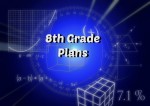My 5th grader is a visual-spatial learner who shines when encountering creative problem solving. He has dreams of a future in a STEM field. As a result, I’ve incorporated lots of creative problem solving into his science studies and I’m using a strong math curriculum.
Math: Art of Problem Solving Prealgebra, Zome Advanced Math Creator 4
with Zome Geometry
, MathExpress Speed Math 4, and MathExpress Speed Math 5
Science: Cells – Ellen McHenry, Engineering Everywhere units – Ice Cream, Urban Landscapes, Insulated Homes (with older brother), Engineering Adventures units – Flying Technologies, Rockets and Rovers, Bubble Wands, Aid Drop Packages, Earthquakes, Recycled Racers, Invasive Species (with younger sister), Chemistry – Ellen McHenry
Computer: Mavis Beacon Teaches Typing– until 40 words a minute, Blender with Youtube tutorials, and C++ programming with Youtube tutorials.
History: Documentary-focused early modern world history with McDougal Little Modern World History book and the A People’s History of American Empire by Zinn. Independent projects.
Geography: Africa (countries and culture) unit study.
Language Arts: Finish Classical Writing Aesop A, Classical Writing Aesop B, Finish Rod and Staff English 4, Start Rod and Staff English 6 (grammar only), Movies as Literature, Megawords 1-2, Evan-Moore Daily Handwriting Practice Modern Manuscript, Evan-Moore Daily Handwriting Practice Modern Cursive, Mindsnaps Vocab app
Reading with an emphasis on visualization: Trumpet of the Swan, Old Yeller, Phantom Tollbooth, Tuck Everlasting, Anne of Green Gables, The Lion, the Witch, and the Wardrobe, Cheaper by the Dozen, Wizard of Oz, I Am David
Arabic: More practice reading Arabic and then start Arabic for Life, Arabian Sinbad DVDs
Japanese: Human Japanese app with me, Mirai Japanese app independently
Greek: Athenaze: An Introduction to Ancient Greek Book I
French: Resources to learn how to read and pronounce French, DuoLingo
PE: Running, Swimming, Nutrition and Fitness study
Fine Arts: Hoffman Academy video piano lessons, Music Ace Deluxe, The Phonics of Drawing
Bible: Evidence for Christianity Study, The Holy Spirit and His Gifts, OT types and shadows study
Logic: Finish Logic Liftoff, Orbiting with Logic, MindWare Grid Perplexors: Level C, Philosophy for Kids
, Finish Building Thinking Skills® Level 3 Figural
I went over a possible schedule with him and he approved this schedule. We tend to change up our schedules every month or two to keep things fresh though. This one will get us started into a good rhythm.
8:45-9:30 Bible
9:30-11:00 Foreign Language and daily Language Arts (i.e. handwriting)
11:00-12:00 Math
12:00-1:00 Language Arts
Lunch break and exercise time (Friday – 1:45-2:45 Nutrition study)
2:15-3:00 Typing (M.T,W,F) 15 minutes, Logic (M,T,W) – 30 minutes, Art or Music Theory (Th) – 45 minutes
3:00-3:45 History with brother (M,T,Th) Independent projects (W,F)
3:45-4:30 Science
4:30-5:30 Music practice, Computer studies
Homework: Run 1 mile







